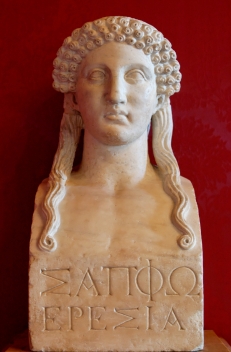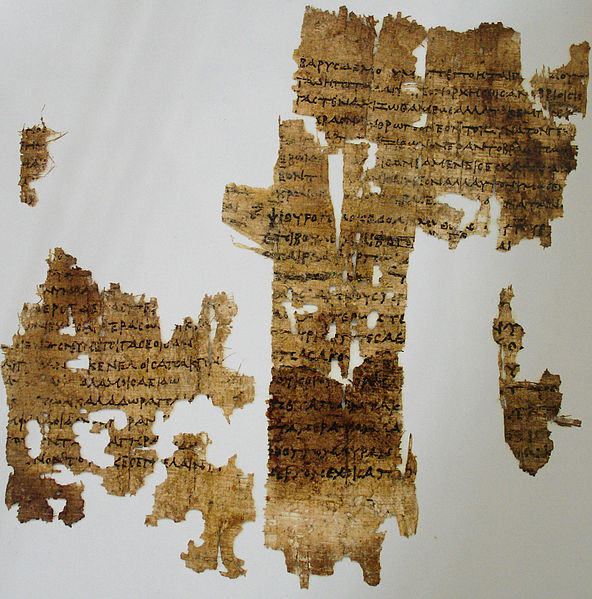Good morning! Time for some poetry to start your Monday off right! (Want more? Click here.)
So I was thinking… this is a lesbian website, and we haven’t talked about perhaps the most famous lesbian of all time: Sappho. I mean, the terms “lesbian” and “sapphic” come from her! Basically she’s the original Ellen. (Do you think in thousands of years they will be calling gay women Ellenese? Or Degenerian?)
Besides being the world’s most renowned lady gay, Sappho is also a poet that can take your breath away. Unfortunately, most of her poems survive only in fragments. However, my favorite, and the one I will be sharing with you, remains in tact.
For a lesbian, Sappho’s work is an opportunity to feel a sense of connection with the past, to see someone like ourselves in a history that has worked so hard to cover us up and keep us in hiding. In spite of it all, Sappho’s poems drip with unabashed love and admiration for her female companions, and they have survived the millennia.
I love Sappho for the beautiful simplicity of her rhythms, and her striking ability to capture emotions and put them into words. Her work is without time; the feelings of love and loss that she experienced two thousand years ago are so very much the same emotions many of us feel today. (I mean, this poem is about being in love with a straight girl! You know we’ve all been there.)
But you don’t have to be a lesbian to enjoy Sappho’s work. For after all, isn’t love – the getting of it, the making of it, the losing of it – an emotion that binds us all in the human condition?
All of her works have been translated from the original ancient Greek, so I am offering two translations in order to provide a variety of viewpoints on the poem’s original wording and intent. The first is more modern, translated in 1958; the second is from nearly a half a century earlier, with a classical rhythm and rhyme scheme. Which do you prefer?
********************

Roman wall painting featuring woman with a pen; modern interpretations have deemed this a representation of Sappho.
He is more than a hero
He is more than a hero
he is a god in my eyes –
the man who is allowed
to sit beside you – he
who listens intimately
to the sweet murmur of
your voice, the enticing
laughter that makes my own
heart beat fast. If I meet
you suddenly, I can’t
speak – my tongue is broken;
a thin flame runs under
my skin; seeing nothing,
hearing only my own ears
drumming, I drip with sweat;
trembling shakes my body
and I turn paler than
dry grass. At such times
death isn’t far from me.
translated by Mary Barnard, 1958
Ode to a Loved One
Blest as the immortal gods is he,
The youth who fondly sits by thee,
And hears and sees thee, all the while,
Softly speak and sweetly smile.
‘Twas this deprived my soul of rest,
And raised such tumults in my breast;
For, while I gazed, in transport tossed,
My breath was gone, my voice was lost;
My bosom glowed; the subtle flame
Ran quick through all my vital frame;
O’er my dim eyes a darkness hung;
My ears with hollow murmurs rung;
In dewy damps my limbs were chilled;
My blood with gently horrors thrilled:
My feeble pulse forgot to play;
I fainted, sunk, and died away.
translated by Ambrose Philips, 1893
********************
What do you think? Answer the poll question and we can see which translation everyone prefers! (I have a preference but I’m not telling!! ;) )






Great post. Loved the history lesson and poem :) Kara XOXOXO
So… why is the poem about a man then? Kind of disappointing.
It’s not really about a man, though she does start off by talking about how lucky he is. She is actually addressing the woman the man is with – she is jealous and pining for the object of his affections.
It’s the classic in-love-with-a-straight-girl situation.
Right, sorry! I posted that before I had read it through. It makes sense now.